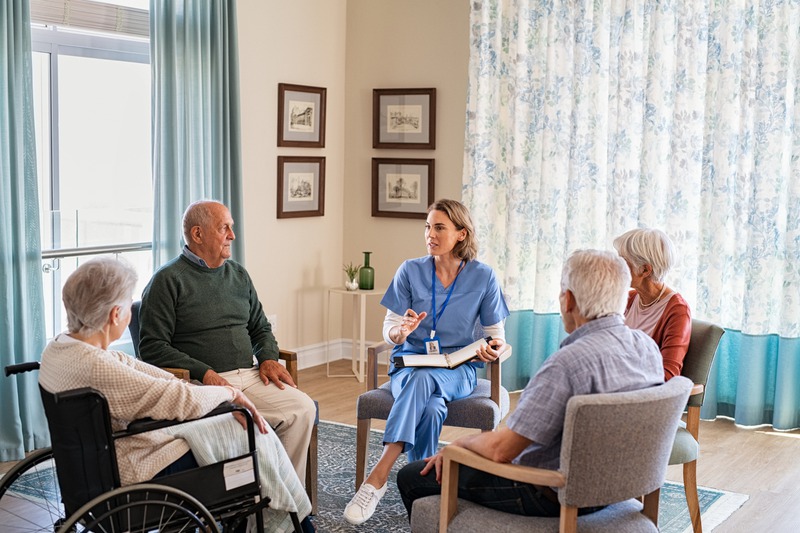Skilled nursing care is a cornerstone in many senior living homes, providing medical attention and personalized care essential for residents with complex health needs. As the aging population continues to grow, so does the demand for comprehensive care services that go beyond the capabilities of standard assisted living facilities.
Skilled nursing care encompasses many services, including physical therapy, wound management, medication administration, and chronic disease management. Skilled nursing care is essential in some senior living homes for several reasons:
1. Specialized Medical Care
Many seniors in senior homes have complex medical needs requiring specialized care and attention. Skilled nursing facilities are equipped to provide round-the-clock medical care administered by trained healthcare professionals, including registered nurses, licensed practical nurses, and certified nursing assistants. These skilled nursing services include wound care, medication management, intravenous (IV) therapy, physical therapy, occupational therapy, and respiratory therapy to address the unique health needs of residents.
2. Chronic Disease Management
Seniors in senior living homes often have chronic health conditions such as diabetes, heart disease, arthritis, chronic obstructive pulmonary disease (COPD), and dementia. Skilled nursing facilities have the expertise and resources to manage these chronic diseases effectively, helping residents maintain their health and quality of life. Skilled nursing staff can monitor residents’ vital signs, administer medications, provide dietary guidance, and implement therapeutic interventions to manage chronic conditions and prevent complications.
3. Post-Hospitalization Care
Many seniors require post-hospitalization care after being discharged for acute medical conditions or surgical procedures. Skilled nursing facilities offer short-term rehabilitation services to help seniors recover and regain their strength, mobility, and independence. These services may include physical therapy, occupational therapy, speech therapy, and medical supervision to facilitate a smooth transition from hospital to home.
4. Palliative and End-of-Life Care
Some seniors in senior living homes require palliative care or end-of-life care due to advanced illness, terminal conditions, or progressive decline in health. Skilled nursing facilities provide compassionate and comprehensive care for residents nearing the end of life, focusing on pain management, symptom control, emotional support, and spiritual care. The staff at Stonebridge Senior Living works closely with residents and their families to ensure comfort, dignity, and quality of life during this challenging time.
5. Safety and Security
Skilled nursing facilities offer a safe and secure environment for seniors at risk of falls, accidents, or medical emergencies. These facilities have safety features such as handrails, grab bars, wheelchair-accessible bathrooms, and emergency call systems to prevent accidents and respond promptly to residents’ needs. Skilled nursing staff are trained to recognize and address safety concerns, minimize risks, and assist with daily activities to promote residents’ safety and well-being.
6. Coordination of Care
Skilled nursing facilities are a hub for coordinating and managing residents’ care needs. They work collaboratively with residents, families, physicians, therapists, and other healthcare providers to develop personalized care plans that address residents’ medical, social, emotional, and functional needs. Skilled nursing staff advocate for residents, ensuring continuity of care, effective communication, and holistic support throughout their stay in the facility.
7. Rehabilitation Services
Skilled nursing facilities, including those specializing in memory care Arkansas, offer comprehensive rehabilitation services aimed at helping residents regain functional abilities and independence after illness, injury, or surgery. These services may include physical, occupational, and speech therapy tailored to each resident’s specific needs and goals. Rehabilitation professionals work closely with residents to improve mobility, strength, coordination, balance, and communication skills, enabling them to achieve maximum independence and quality of life.
8. Assistance with Activities of Daily Living (ADLs)
Many seniors in senior living homes require assistance with activities of daily living (ADLs) due to physical or cognitive limitations. Skilled nursing facilities provide personalized assistance with ADLs such as bathing, dressing, grooming, toileting, and eating to help residents maintain their dignity and independence. Certified nursing assistants (CNAs) and other trained caregivers offer compassionate support and encouragement while respecting residents’ preferences and individual needs.
9. Wound Care and Complex Medical Treatments
Seniors with chronic wounds, infections, or other complex medical conditions may require specialized wound care and medical treatments. Skilled nursing facilities have the expertise and resources to provide advanced wound care techniques, including wound assessment, debridement, dressing changes, and infection control. Additionally, skilled nursing staff can administer complex medical treatments such as intravenous (IV) therapy, antibiotic therapy, pain management, and respiratory support to address residents’ acute and chronic medical needs.
10. Emotional and Social Support
In addition to physical and medical care, skilled nursing facilities offer emotional and social support to promote residents’ overall well-being and quality of life. Activities such as group outings, recreational programs, arts and crafts, music therapy, and pet therapy provide opportunities for socialization, engagement, and enjoyment. Skilled nursing staff also offer residents emotional support, companionship, and encouragement, fostering a sense of belonging, community, and purpose within the facility.
Wrapping Up
Skilled nursing care is indispensable in certain senior living homes due to the extensive healthcare needs of their residents. The complexity of managing chronic conditions, recovering from surgeries, and maintaining overall health and wellness in older adults necessitates a level of care that only skilled professionals can provide. Skilled nursing facilities not only deliver critical medical services but also offer emotional support and social engagement, which are vital for the holistic health of elderly individuals.

